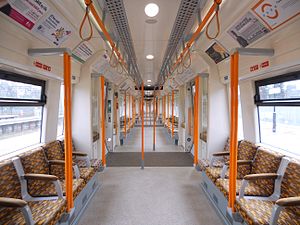British Rail Class 378
| British Rail Class 378 Capitalstar | |
|---|---|

London Overground Class 378/2 No. 378255 at Watford Junction
|
|

The interior of a London Overground Class 378
|
|
| In service | 29 July 2009 – present |
| Manufacturer | Bombardier Transportation |
| Family name | Electrostar |
| Replaced |
Class 313 Class 508 Class 456 |
| Number built | 57 trainsets |
| Formation | 5 cars per trainset 378/1: DMOS-MOS(B)-TSO-MOS-DMOS 378/2: DMOS-MOS(B)-PTSO-MOS-DMOS |
| Operator(s) | London Overground |
| Line(s) served |
East London Line North London Line South London Line Watford DC Line West London Line |
| Specifications | |
| Car length | 20.4 m (66 ft 11 1⁄8 in) |
| Width | 2.80 m (9 ft 2 1⁄4 in) |
| Height | 3.78 m (12 ft 4 7⁄8 in) |
| Maximum speed | 75 mph (121 km/h) |
| Weight | 159.5 t (157.0 long tons; 175.8 short tons) |
| Power output | 600 kW (800 hp) per driving car (3 × 200 kW (270 hp) motors) |
| Electric system(s) | Class 378/1: 750 V DC third rail only Class 378/2: 750 V DC third rail / 25 kV 50 Hz AC overhead lines |
| Current collection method | Class 378/1: Contact shoe only Class 378/2: Contact shoe / Pantograph |
| Track gauge | 1,435 mm (4 ft 8 1⁄2 in) standard gauge |
The Class 378 Capitalstar is a type of electric multiple unit train, part of Bombardier Transportation's Electrostar family. These trains are operating on the London Overground network, for which they were specifically designed. The design is similar to the Class 376 trains used by Southeastern, featuring the same wider metro-style sliding pocket doors for more efficient boarding and alighting, which are faster and more reliable than plug doors, although they do not close flush with the bodyside and hence are less aerodynamic and do not provide as much heat insulation. However, they also have significant differences from the Class 376, such as fully longitudinal seating similar to that used on to give more standing and seating capacity and reduce overcrowding, suitable for the high-volume metro-style services on London Overground. The units also have end gangways, but these are intended for emergency use only. The units were initially announced as coming in two separate batches.
The deal between Bombardier and Transport for London was initially for a total of 152 individual cars costing some £223 million, with deliveries beginning in September 2008, when two trains underwent a 14-week test on the North London Line. The initial contract also contained an option to purchase additional cars up to a total of 216. A newly constructed depot near New Cross Gate station would be responsible for maintaining the new fleet.
In 2006, TfL announced the new vehicles, with livery designed by Real 451 and interior concept design by Design Triangle.
On 4 July 2007, TfL announced it had ordered a further 36 Capitalstar carriages for £36 million. The order comprised three additional four-car units for the East London Line, and 24 additional carriages to extend the original 3-car units for the North London Line into 4-car units, to be delivered in 2011.
In February 2008, TfL announced that the new stock would now be leased by London Overground, rather than purchased directly, from a newly formed ROSCO named QW Rail Leasing. The terms of the lease also allow for an increase in the order to 216 vehicles. In April 2008, TfL announced it had taken an option to obtain a further seven 4-car dual-voltage units, delivered between 2009 and 2010 and fulfilling the vehicle option.
...
Wikipedia
